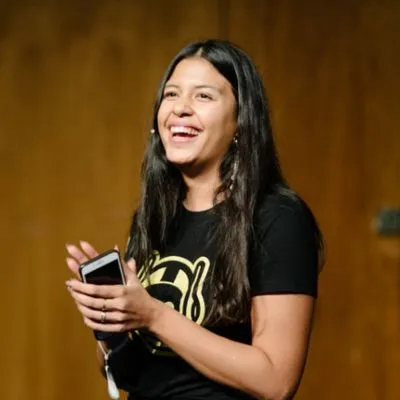What if your love for connecting with people could turn into a meaningful, well-paid career—no coding, tech degree, or industry experience required?
That’s the magic of becoming a Community Manager.
Whether you’re new to tech or making a career switch, this role is all about people. If you can listen, share, and bring others together, you’ve already got what it takes. With the right tools, you can build thriving online communities that drive real impact.
This isn’t just a job — it’s your chance to lead, grow, and make a difference. Ready to jump in? Let’s go.
Think of a Community Manager as the friendly face of a brand in the digital world. Instead of coding, they use tools like Slack, Circle, and Notion to engage audiences, share content, host events, and keep conversations flowing—all without touching a single line of code.
It’s like being the host of a buzzing online space, making sure everyone feels welcome, heard, and connected. Whether it’s answering questions, starting discussions, or collecting feedback, Community Managers keep the digital vibe strong.
And the best part? You don’t need tech skills to thrive. If you’ve ever moderated a group chat or planned a meetup, you’ve already got what it takes.
Freelancers: $30–$100/hour
Full-Time Roles: $55,000–$100,000/year
Senior Positions: $100,000–$140,000/year
• 86% of companies report the role is essential for their success (CreatorLabz)
• Active online communities boost customer retention by 53% (CreatorLabz)
• Social manager jobs are projected to grow 8% by 2033 (US BLS)
Tech Startups – Explore jobs on Built In
Freelance Platforms: Find gigs on Workana and Upwork
Digital Agencies: Work with digital Community Management Agencies like Z Digital Agency and Fresh Content Society
Companies: Explore roles at LinkedIn Jobs
Every day is a mix of connection, content, and community building. Here’s a realistic snapshot:
Kick Things Off with Conversations
Start by welcoming new members, replying to posts, or checking in on your Slack or Circle communities. It’s all about setting a positive tone and building trust.
Spark Engagement and Share Value
You’ll plan interactive posts, schedule content, or organize virtual events to keep members involved. Tools like Notion or Buffer help keep things running smoothly.
Track What’s Working
Using platforms like Orbit or Common Room, you’ll review member activity, see what’s resonating, and adjust your strategy as needed.
Plan the Next Move
Wrap up by updating your community calendar, coordinating with teammates, and setting goals for tomorrow. It’s not just about keeping things active—it’s about creating lasting impact.
You don’t need a tech background to become a great Community Manager. This role is all about connecting people, solving problems, and creating meaningful experiences online. If you’re a natural communicator and love building relationships, you’re already halfway there.
Curious how to get started? Let’s break it down step by step!
To become a Community Manager, start by building a strong foundation in the essential skills you'll need to succeed. These include both technical skills and soft skills that complement your work.

Collaborate effectively with clients and teams by explaining ideas clearly.

Settle disagreements calmly and fairly to keep things on track.

Understand the needs of your users and clients to build impactful solutions.

Influence without authority, inspire teams, and foster collaboration.

Critically and creatively analyze issues to design workflows and apps that provide effective solutions.
Your portfolio is your proof of potential. It shows what you can do, how you think, and how you engage a community—even if you're just starting out. Don’t worry—you can start simple and grow as you learn.
1 Create a Community Project
Start a small online community using tools like Circle or Slack. Focus on a topic you’re passionate about and practice posting, moderating, and engaging.
2. Document Your Work
Use Notion or Google Docs to create a case study: What was your goal? How did you engage members? What were the results?
3. Show Your Strategy
Outline your approach to content planning, member onboarding, or engagement tactics. Use free templates like Miro’s Community Canvas to frame your ideas.
4. Include Testimonials or Screenshots
If you’ve moderated groups on Facebook, Discord, or forums, grab screenshots or ask members for quick quotes. Real-life feedback adds credibility.
Explore simple project ideas to kickstart your portfolio and showcase your skills effectively to potential employers.
Discover ready-to-use templates to present your work professionally, enhance your portfolio, and stand out.
Learn essential tips to craft a compelling, well-structured portfolio that highlights your skills effectively.
Take a look at how these professionals have built successful careers in community management:

Developer community growth, engagement strategy, event and program management
OutSystems Platform, Community Management Platforms, Event Management Tools
Leads global developer community programs, fostering engagement, recognition, and growth across multiple regions and initiatives.

Community building, no-code tools, UX/UI design, event hosting
Discord, Webflow, Figma
Former teacher turned tech leader, founded Floxies and scaled multiple global communities with a focus on inclusivity and empowerment.
You’re closer than you think to landing your first role. Whether you join a company or go freelance, there’s a path that fits your pace—and your passions.
Show Off Your Work
Make your portfolio and LinkedIn shine. Share your community project, post about your learnings, and highlight real examples of how you’ve engaged and grown a group.
💡 Need help? Check out this guide on “How to showcase your digital skills on your resume”.
Look in the Right Places
Job hunting is easier when you know where to look:
🔎 Want more references? We gathered +30 Upwork-like websites to kick start your freelancing career.
Make Connections That Count
Join community-focused spaces like CMX Connect, Rosieland, or join a group on Meetup. Attend webinars, engage in discussions, and don’t be shy, networking opens doors faster than cold applications.
🤝 Here’s a great resource with “7 Networking strategies to boost your career growth”.
Start Small, Dream Big
Pitch your skills to early-stage startups or nonprofits. Offer to run a trial community or improve engagement in an existing one. Even small wins build confidence—and your credibility.